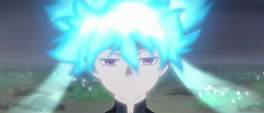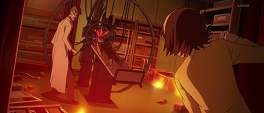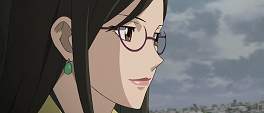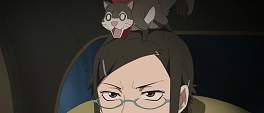The second season of Darker than Black requires a lot of faith to watch for it not only dawdles when it should be running, it becomes increasingly obvious that it will not answer any of the questions posed in the first series, but will be raising innumerable subsequent questions. Ambivalence when beginning the new series will make the ending, if it is reached at all, all the more bitter; Darker than Black: Ryuusei no Gemini expends every chance to present a complete and satisfying series instead fixating on trivialities and ignoring aspects which desperately needed addressing.
Set an indeterminate amount of time after the end of season one, Gemini of the Meteor picks up with Hei, now working for the CIA, in Russia. Dishevelled and abrasive he collides with a young girl, Suou, who has just lost most of her family in an attack and is on the run from the authorities. In a seemingly purposeful act, Suou becomes a Contractor and able to materialise an anti-tank rifle from a necklace given to her by her father. An uneasy alliance between Suou and Hei begins, bolstered by the doll July and the return of Mao who now resides in a neckerchief wearing squirrel, they all begin the perilous journey to Japan. Dogged by both Russian forces as well as the mysterious Japanese Section Three, whose new recruit Misaki is eager to discover the truth to ongoing events more than to apprehend the fleeing fugitives, the trip will not be easy and exposes difficult truths about everyone involved in the Hell's Gate incident portrayed at the climax of the first series.
To call this series of Darker than Black anything other than criminally disappointing would be understating how much cautious promise it initially engendered. The first season was flawlessly produced but lacked anything sizeable to sink one's teeth into - remaining consistently aloof and withholding all but the most contextless snippets of information. The second season is much the same but the pretence of explanation has been eroded, brand new and obscure terms are pivotal to the story and a crucially important document materialises without prior reference and leads the delectable Misaki directly to Hei. It's hard not to assume that the cast are engaged in lengthy exposition but only when the viewer is otherwise forced to watch some entirely unrelated event such as the distasteful fixation a dreadlocked teenager shows towards the prepubescent Suou. Or the inconsequential kidnap of July which introduces one of the best antagonists the series has to offer and promptly kills them off without pause.
While death plays a significant part in the story there is a pronounced lack of emotion, not helped when the more significant demises are bereft of permanence. The worst offender for this is the dispatch of a flamboyant Contractor in the first three episodes who shows up in the climax for no discernible purpose. Conversely people dear to Suou, arguably the protagonist of the series, die and she grieves for but a moment before carrying on; it's symptomatic of what spoiled the first season: the lack of believability. Supposedly a Contractor is stripped of their emotion during their genesis, however the ones we have the most exposure to - Hei, Suou and Mao - all emote to varying degrees and the contrast between them and the humans isn't enough to be convinced it isn't simply poor writing. There are of course plot-based reasons for their ability to feel but when that plot also sports flying cars, a talking squirrel, an aggressive bisexual and ill-defined organisations, credibility becomes an issue.
What the series lacks more than integrity however is poignancy, something the first had despite its impenetrability. Both jargon and story, with their combination of astronomy and religious overtures, began to organise the characters into a coherent formation; the hope was that with further episodes this would continue until something akin to an explicit understanding could be gained. Instead the previous twenty six episodes are rendered moot and possibly the most important information - what happened in the intervening period between the first and second seasons - is omitted in favour of OVAs. It's a cynical move likely designed to increase flagging DVD sales but is built on the premise that purchasers will trust these episodes reveal enough to be worthwhile when the meat of the series has neglected quite spectacularly to do so. Only the final episode threatens to provide any information about the Contractors and the Meteor but it fails to explain the current series happenings let alone the previous one's.
A nagging thought that continues throughout Darker than Black: Ryuusei no Gemini is that perhaps with a fresh rewatch of the first season, events might become more intelligible. The question that inevitably follows that however: is it worth it? Thirty eight episodes later and there is difficulty remembering any part of the entire story that stood out barring Misaki's Chinese Dress escapades; when others can craft sweeping adventures rife with heartbreak and jubilation in less time, the deadpan seriousness of Darker than Black, even in the midst of farcical costumes and set ups, is dismaying. The studio and the talent behind the series, even if Yoko Kanno is absent for this outing, would imply a more competent offering but instead this is a vastly underwhelming production. All chances that Darker than Black had to elevate itself have now been spent and the likelihood that the forthcoming episodes will change this is slim, it's now time to resign the series to the pile of missed opportunities and wasted time.












Also, UNTZ UNTZ UNTZ UNTZ